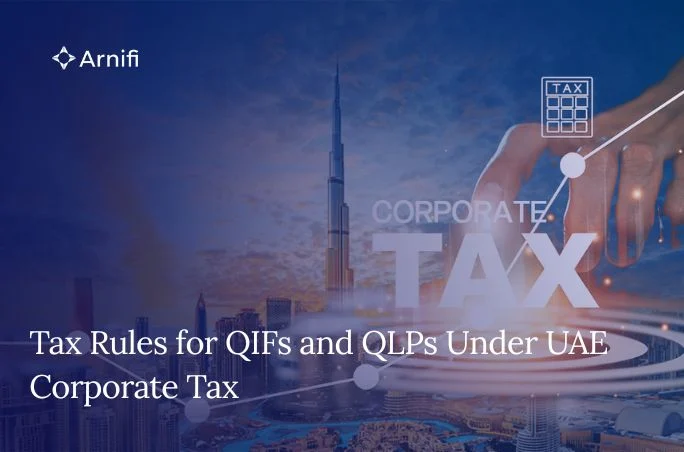Tax Rules for QIFs and QLPs Under UAE Corporate Tax
by Ishika Bhandari Nov 22, 2025  10 MIN READ
10 MIN READ

Table of contents
- Why Do QIFs and QLPs Matter?
- Legal Framework for Tax Rules on QIFs and QLPs
- When is QIF or QLP Status Relevant?
- Core Conditions for QIF Exemption
- Core Conditions for Qualifying Limited Partnerships
- Tax Treatment of Investors in QIFs and QLPs
- Practical Compliance Checks for Fund Sponsors and Managers
- Common Mistakes to Avoid While Filing UAE Corporate Tax
- How Arnifi Supports QIF And QLP Tax Governance
- FAQ
The UAE Corporate Tax regime treats tax rules for QIFs & QLPs as a specialist area, because an incorrect classification changes the rate on large investment pools.
Federal Decree-Law No. 47 of 2022 on the Taxation of Corporations and Businesses sets the base exemption for qualifying investment funds, while Cabinet Decision No. 34 of 2025 adds detailed conditions for Qualifying Investment Funds and Qualifying Limited Partnerships.
Let’s know everything about Tax Rules for QIFs and QLPs in this detailed guide.
Why Do QIFs and QLPs Matter?
Under the Corporate Tax Law, a Qualifying Investment Fund (QIF) that meets prescribed conditions is treated as an exempt person. A Qualifying Limited Partnership (QLP) can also be exempt where it operates as an investment platform rather than as a trading or real-estate vehicle.
This treatment keeps fund structures competitive against rival hubs and prevents multiple corporate-level charges inside a collective investment chain.
At the same time, Cabinet Decision No. 34 of 2025 gives the Federal Tax Authority (FTA) clear tools to bring income back into the tax net at investor level when control or concentration thresholds are breached.
Legal Framework for Tax Rules on QIFs and QLPs
Corporate Tax for funds and partnerships operates within several layers of law and guidance:
Federal Decree-Law No. 47 of 2022 defines Corporate Tax, sets the standard 0 percent and 9 percent rates and lists exempt persons, including qualifying investment funds.
Article 10 of the same law allows an investment fund or Real Estate Investment Trust (REIT) to apply for exemption when conditions on regulation, investor spread and main purpose are satisfied.
Cabinet Decision No. 34 of 2025 replaces and updates earlier Cabinet Decision No. 81 of 2023. It sets conditions for QIF status, defines QLPs, and explains how income of investors in exempt QIFs and QLPs must be adjusted.
When is QIF or QLP Status Relevant?
QIF status usually matters for regulated funds that pool third-party capital for securities, private equity, real-estate or multi-asset investment. Exemption avoids an intermediate tax charge at fund level, while leaving investor-level taxation intact under specific rules.
QLP status is aimed at limited partnerships that act as collective investment platforms and meet strict rules on activity focus and immovable property income.
The structure must be set up under a legal framework that allows limited partnerships before 1 June 2023 or any later approved framework.
Family holding structures or operating companies that mainly run a trade and hold UAE real estate or other private assets rarely fall under the QIF or QLP regimes.
Core Conditions for QIF Exemption
Cabinet Decision No. 34 of 2025 builds on Article 10 of the Corporate Tax Law and sets additional conditions before an investment fund can apply for QIF status:
- The main business of the fund must be Investment Business; any other business must stay ancillary or incidental and limited to 5 percent of total revenue.
- Investors must not control day-to-day management of the fund. Governance is exercised through the manager or board, not by direct investor intervention.
- The fund or its manager must be under regulatory oversight by a competent authority, domestic or foreign, in line with the Corporate Tax Law conditions.
- Investors must receive sufficient information and data to calculate their own taxable income adjustments under the Decision.
Important advice: Separate rules apply to REITs seeking QIF status, including a minimum AED 100 million portfolio of UAE immovable property (excluding land), a minimum free float or institutional ownership test, and a requirement that at least 70 percent of assets consist of income-generating rental property.
Core Conditions for Qualifying Limited Partnerships
A QLP sits closer to private fund structures that use a partnership wrapper but still seek exemption at entity level. Cabinet Decision No. 34 of 2025 lets a QLP apply for exempt status where its profile fits an investment platform and not a real-estate or trading group.
Key conditions include:
- The main activity of the QLP must be Investment Business, and any other activity must stay ancillary or incidental within a 5 percent revenue cap for that year.
- The QLP must not earn income that arises due to using, selling or letting UAE immovable property or rights over such property.
- The main purpose of the QLP cannot be to avoid Corporate Tax. Economic intent and commercial substance must support the structure.
Tax Treatment of Investors in QIFs and QLPs
Corporate Tax on investors follows the new rules. For example, Cabinet Decision No. 34 of 2025 keeps the fund itself exempt in many cases, then uses income and control tests to bring amounts into the investor’s tax base.
Investors in QIFs
- For an exempt QIF, profit distributions are not taxed again when investors compute Taxable Income.
- A juridical investor must “look through” and include its share of QIF net profit when it holds, with related parties, at least 30 percent in a QIF with fewer than ten investors, or 50 percent in a QIF with ten or more investors.
- This rule does not apply in the first two financial years of a new QIF if future spread is expected, and short breaches under ninety days can also fall outside the test.
- If the fund’s UAE immovable property exceeds 10 percent of assets, a juridical investor may need to include 80 percent of its share of that income, unless at least 80 percent is distributed within nine months.
- On exit, earlier undistributed profits already taxed under these rules can be removed, capped at the gain.
- Non-resident investors can appoint a Tax Agent directly or through the fund or manager.
Investors in QLPs
For an exempt QLP, investor treatment follows a different pattern:
- Profit distributions are excluded when investors calculate Taxable Income, so cash flows mirror the QIF outcome.
- A juridical investor that is a Taxable Person must include its share of the QLP’s net income and that of any fully owned exempt entities under the QLP, after removing amounts already taxed in the investment manager.
This approach treats the QLP as tax-neutral at entity level but transparent for corporate investors inside the UAE.
Practical Compliance Checks for Fund Sponsors and Managers
Sponsors and managers need a repeatable checklist so QIF or QLP status does not drift. Many of these checks can sit inside normal year end and EmaraTax routines instead of a separate workstream.
Useful checks include:
- Mapping each fund or partnership to the correct legal label in Federal Decree-Law No. 47 of 2022 and Cabinet Decision No. 34 of 2025, then confirming that EmaraTax registrations and internal charts use the same language.
- Testing every structure against the 5 percent ancillary income cap and confirming that any trading or advisory revenue stays below that limit on a rolling basis.
- Tracking investor counts and concentration each quarter, so the 30 percent and 50 percent thresholds do not surprise investors at year’s end.
- Monitoring the immovable property percentage and rental profile for each fund that has UAE real-estate exposure, to anticipate any 10 percent and 80 percent tests that drive investor-level adjustments.
Fund Managers Need to Align Financial Statements With Corporate Tax Data
It means keeping clear schedules that reconcile profit in the accounts to taxable profit shares, depreciation elections on investment property and any income already pushed into an investment manager’s own return.
Finally, accounting teams should prepare standard investor information packages that explain the fund’s QIF or QLP status. Also, they must include any percentage thresholds at risk and how investors should adjust their own returns based on the data supplied.
Common Mistakes to Avoid While Filing UAE Corporate Tax
Even experienced fund groups can misread the new regime. Some issues arise due to old structures that pre-date the Corporate Tax Law, others due to copied terms that do not fit UAE rules.
Here are some mistakes to avoid:
- Using a limited partnership that earns direct UAE rental or property disposal income, then expecting QLP exemption even though the Decision bars immovable property income for QLPs and their wholly owned vehicles.
- Overlooking concentration tests when cornerstone investors or sponsor vehicles hold large blocks, which later forces investor-level net profit inclusion that nobody modelled at launch.
- Relying on offshore regulatory approvals and not securing adequate UAE or recognised foreign oversight, so QIF conditions tied to supervision and investor protection are not fully met.
- Keeping mixed trading and investment activities in the same entity, then breaching the 5 percent ancillary income cap and losing exemption for a full period and four following periods in the case of QLPs.
Many of these issues can be managed by early reviews of partnership agreements and providing supporting letters, before a fund seeks formal exemption recognition or renews its filings under the new Decision.
How Arnifi Supports QIF And QLP Tax Governance
QIF and QLP work needs experienced accountants to ensure the business status is out of risks of penalties due to incorrect corporate tax filings.
Arnifi helps businesses in UAE and managers by:
- Reviewing current fund and partnership charts against Federal Decree-Law No. 47 of 2022 and Cabinet Decision No. 34 of 2025 to confirm where exemption is realistic and where a standard taxable profile is safer.
- Designing practical concentration and immovable property tracking files, so investor relations and finance teams see threshold pressure early in the year and not at audit stage.
- Aligning financial reporting, investment manager mandates and EmaraTax positions, so the same logic appears in board packs, audited accounts and tax returns.
On top of this, Arnifi’s professional accounting and bookkeeping services prepare investor information notes, sample side letter wording and QIF or QLP exemption packs that fit FTA expectations. Thus, approvals and ongoing compliance stay on schedule.
FAQ
Q1. What are the basic tax rules for QIFs and QLPs in UAE?
The tax rules for QIFs & QLPs sit under Federal Decree-Law No. 47 of 2022 and Cabinet Decision No. 34 of 2025, which let vehicles apply for corporate tax exemption.
Q2. What are the main QIF and QLP compliance requirements?
The QIF and QLP compliance requirements demand Investment Business as the main activity, a 5 percent cap on ancillary revenue and oversight by a regulator with a diversified investor base.
Q3. How do new tax rules in Dubai affect investors in QIFs and QLPs?
Under the new tax rules in Dubai for QIFs and QLPs, funds avoid tax, but concentrated juridical investors may add net profit or immovable property income into Taxable Income calculations.
Q4. What are key exemption rules for qualifying investment funds?
The exemption rules for qualifying investment funds require Investment Business as main activity, a 5 percent cap on ancillary income and regulated oversight with investors spread, so no group dominates.
Q5. How do general tax rules in Dubai interact with QIF and QLP regimes?
For funds, the tax rules in Dubai treat approved QIFs and QLPs as exempt persons, but investors still apply UAE corporate tax to amounts brought into their own tax base.
Top UAE Packages

Related Articles
Top UAE Packages



